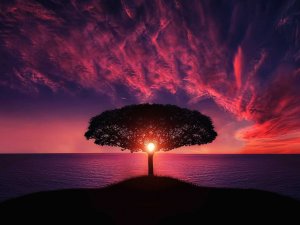On the Internet, in Webinars and on internet chats on Sikhi, readers respectfully cite the seminal work of Principal Sahib Singh, the legendary translator and major exponent of the lexicon and grammar of Guru Granth Sahib. And then, often, all hell breaks out when some readers write off his work as obsolete, inaccurate, even biased in places, or too dependent on Hindu sources and interpretations.
His critics then have the temerity to dismiss him - he was too dependent on Sanskrit sources and Hindu roots, they allege. I am not here to defend every word or idea of Sahib Singh, nor to summarily trash his work.
Instead I want you to look at the past, present and future somewhat differently.
I think the Indian culture, from which most of us come, views discussion of ideas somewhat akin to a freewheeling wrestling match or duel to the finish in which one fighter is pinned down flat on his back while the other is hailed as the conqueror, if not the Messiah. That's the modus operandi of the boxing ring or an arena, or as we dub it in Punjabi, an akhaara. This is the way I see many exchanges on the Internet when we parse randomly selected passages or concepts from Gurbani.
I see an unending number of Sikh sites that promote such exchange, even diatribe. They bother me; yet I celebrate them all. Dialogue is an art, a skill that is somewhat under-appreciated in our community. All it needs to flower is some honest practice along with a little introspection, laced with a touch of humility.
Let's start with a truism - my axiom for the day.
If today, we can see more clearly and further it is because we are perched on the shoulders of others - our predecessors who lived and worked generation(s) ago. Were they all giants? Likely not, and certainly not by our standards of today, but that should not automatically diminish them.
Yes, judge the past as we must, but do so by the context, culture, language, and realities of those times, not by the values and yardstick of today. Remember that the future will judge us just as harshly (or kindly) as we judge the past from our vantage point today.
As an aside I point out that Thomas Jefferson was a slave owner who, history tells us, had a lasting liaison with his slave, Sally Hemmings. He remains an icon, if judged by the standards of his time, an unquestioned giant of this progressive society. And a complex but weak man if judged by the yardstick of today.
Keep in mind that religions emerge in existing communities and, as they arise, they create new communities, often along with identifiable territories. Nothing emerges de novo or in a vacuum.
Every narrative, written or spoken, is rooted in the lexicon, mythology, and cultural framework of its time or else it will make little sense to its readers or listeners. If everything arises from existing reality it is natural that the old and the new will intermix, merge and share much foundational framework - geographical and cultural space, idiom, vocabulary, expression, even elements of lifestyle. In fact, we should be shocked, even disappointed, if the practices and traditions of the past, though they embarrass us today, are missing from our historical narrative.
We just need to be watchful that the past does not force us into a quagmire in interpretation for living today.
For example, Christianity rejects some, but not all, that came to it from The Old Testament and its Jewish roots. But when it expanded to a non-Jewish world, it embraced the language of its new environs -- Latin and Greek along with some corresponding interpretations, even practices. As an example: The title "Christ" (yes, it is a title, not a name) meaning "messiah" or "above the five tattvas" comes from the Greek Christos.
Most scholars accept that the singular identity of Christianity was not established for its first 300 years and its delineation from Judaism was not so clear. Other scholars extend Judeo-Christian commonality of mixed practices and identity to the first 900 years or so. For example, the day of the Christian Easter was finalized only in the 8th or ninth century.
It's natural then that during their early development, religions with overlapping borders exhibit many mixed ideas and practices. I point to Christianity and Sikhi today, many other faiths display similar oddities.
Ergo, if references to fables, parables and Hindu mythology are widely found in Sikh lexicon why should it shock us? If some vocabulary of Sikhi emerges from Hindu roots, why should it surprise us? Remember that the origins of Sikhi are closely intertwined with Hindu cultural space, roots, and societal practices. Most early Sikhs came to Sikhi from Hindu antecedents, including the first three Gurus.
Yet, it is essential to note that in Sikhi many Hindu practices are rejected totally, partially, or dramatically altered in interpretation. Such visible mix will, at times, lead to misinterpreting the message of Sikhi. But neighboring people and cultures are not intermixed to willfully corrupt each other; such a mix is inevitable to framing an issue appropriately at a given time.
Hence, my words are emphatically not meant to diminish or overlook the originality of Sikh thought and perspective.
To keep things simple, I will deliberately overlook Islamic antecedents that also exist in Sikhi. If Judeo-Christian literature had been widely available, I believe, more of it would have found inclusion and commentary in Sikh scriptural writings.
I frame my argument today around one powerful case study; I assure you that many such examples exist. The opening phrase of the Guru Granth is an alphanumeric - Ik Oankaar coined by Guru Nanak. This powerful shorthand carries, to my mind, the entire message of Sikhi; all else is commentary, but that is a matter for a different time.
That "Oankaar" comes from Sanskrit and is widely used in Hindu practice is self-evident, but it also mightily offends many Sikhs. Their sense of the purity and originality of Sikh ideology is apparently challenged, if not compromised, by the Sanskrit and Hindu antecedents. So, they push for a novel variation in its pronunciation that is not based on the grammar of any Indic language of the time or place - Punjabi, Hindi, Braj, Pali or Sanskrit among many others.
We know of examples in Guru Granth (p. 929 and elsewhere) where the word Oankaar is phonetically displayed to be read exactly as in any Hindu/Sanskrit text. I repeat, in the Guru Granth some Hindu ideology seems to have been adopted only in part, adapted, or cast overboard.
To the unwary reader, the message appears to replicate Hindu pantheon or practices. Methinks to get alarmed on such matters or beat the drum of internecine war is tempting but it is neither logical nor productive.
We should explore, nurture and embrace the originality of meaning and application of the words as used by the Guru-Founders of Sikhi. And that interpretation is often dramatically different from Hindu practice. Intellectual gymnastics and head games to coin an entirely new fantastical idea or vocabulary do not help.
If my words seem harsh, that's not my intent. And I happily acknowledge, for example, Canada-based Devinder Singh Chahal and his cohorts on the matter of Ik Oankaar even though I passionately disagree in part with their very passionate position and interpretation around it. From civil discourse over time will arise clarity?
What is certain is that we must confront the past to define the future. It emphatically does not mean that we should reject the past in toto, unless unimpeachable evidence tells us so.
The past made us what we are; the present promises a future based on where we are today; both the journey and the end will remain imperfect, even incomplete. The baton is in our hands but soon enough will pass on to a new generation.
The past informs us where we are today and how we got here. The stories and traditions of the past enable us to touch history as nothing else can. All history lives through traditions. Also, all historical narrative is chock full of "cunning passages and contrived corridors," as T.S. Eliot reminds us.
If we find the past with no blank voids that baffle or mislead us, it means that our present vision is far from perfect. No matter how we tweak it and try stitching the past into a seamless reality today, future generations will find gaps - or they are not exploring well or honestly.
My plea is not to slap down the scholars of the past, nor to condemn them for shortsightedness, sloppy scholarship, or questionable motives but to celebrate their efforts. Imperfect as they were, their work opened many doors for us. We march forward but sometimes in our maniacal frenzy we lose all direction and a sense of where we are; other times we dance triumphantly through yesterday into today with a clear shot at tomorrow.
Remember that the future will see us as imperfect, as it should. If tomorrow's readers don't catch our flaws, then they are not doing their homework very well.
Mine is not a defense of Sahib Singh or other past scholars of Sikhism, nor is this to castigate and excoriate them. Sahib Singh, Bhai Vir Singh and their ilk are iconic, but not always, and less today than ever. I admire their work, but I also disagree forcefully with each at times. The likes of Professor Sahib Singh, Bhai Vir Singh, Sirdar Kapur Singh and Professor Puran Singh (and there are many more) were the giants of yesterday.
Just think: How many time-honored "truths" of life turned out to be obviously false? We no longer honor the idea of a flat earth, and that was the ruling doctrine not so long ago. We lived with an erroneous idea of exactly how many human chromosomes exist, as well as their function, until the mid-twentieth century, but no longer. Such is the narrative in all human activity, be it science, sociology, religion, politics, or any other human endeavor.
Life teaches us that even the biggest giants have feet of clay. Look at Gregor Mendel, the monk whose pioneering work on smooth and wrinkled peas opened doors to the fundamentals of genetics. Now we know that his conclusions were sound but his calculations were flawed and suspect.
Wouldn't you expect to encounter a similar cycle and fate for many of our newly discovered truths of today?
Disagreements are useful. They need not be divisive. Often, they clarify questions. Shutting down discourse is a bad habit we seem to have picked up from our historical path. Now, gurdwaras often function as closed shops, and actively condemn alternative views or open dialogue. They shut off all progress.
Our solution to disagreements should not be an immediate vilification of those we disagree with, accompanied by a run to start new gurdwaras. A monolithic, monochromatic version of the truth does not sit well and is not necessary.
There is only one lasting lesson: some humility, a little less hubris, and a little more kindness for the past that brought us to the present. Some honest pursuit of human history would serve us well. Time diminishes us all, even our icons.
The giants of yesteryear! On their shoulders, we stand today, even if they had feet of clay. Our minds explore the past and connect to the future. That's how we see far to the end of the rainbow. But at times these "icons" appear as dwarfs that cloud our vision and obscure our goals.
If we sunder the links to the past, the present and future in the chain of time will leave us dizzy and dislocated.
I repeat: Nothing emerges de novo or in a vacuum. Such is life.
C'est la vie
[email protected]
2017
Photo credit:© Tracy Hebden | Dreamstime.com - Savings





